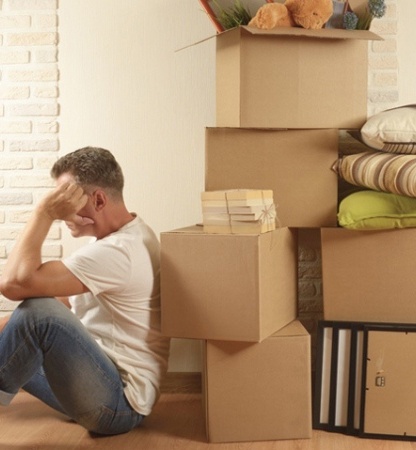How To Feel Better About Your Big Move

This blog is featured in the Mindful Life’s Young Adult Series (the Mindful Life is the blog of the Mindful Counseling Center), which is written by young adult bloggers for young adults. This particular blog focuses on the stress that making a big move to a new area can trigger and ways to ease your stress.
For many of us, there comes a day when we make the decision to finally leave the nest.
For me, the first time I moved out of my family home was when I was going to college. At the time, I had never spent over a week away from my family, and the thought of living in an unfamiliar place on my own for a long period of time was frightening. My new “home” at college was almost four hours away from my family home, and I had no roommate and no friends yet there (as a result of COVID-19). The distance from my family and the lack of built-in college friends left me feeling quite anxious, to say the least, and all I wanted to do was hide away in my room, since I really didn’t know anyone. While now it is safe to say that I have gotten over that stretch of stress and anxiety, it was not an easy journey to the finish line.
Moving is stressful for people in many different ways. You may be stressed about the area that you are moving to, the costs of moving, or how much time it takes to make the transition. While planning your move and actually moving and then getting settled, you may:
may be stressed about the area that you are moving to, the costs of moving, or how much time it takes to make the transition. While planning your move and actually moving and then getting settled, you may:
- Find it hard to relax
- Want to avoid people
- Become easily overwhelmed and triggered
- Feel depressed and unproductive
- Have poor focus
- Be forgetful
- Lack organization
- Think negatively
- Not feel able to make sound decisions
- Constantly worry
Another feeling that a lot of people develop in the process of moving is sadness and even depression. Relocation depression is a form of situational depression that can have the same symptoms of a clinical form of depression. Some of these symptoms may include:
- Feeling down or experiencing a persistent low mood
- Feelings of anger or irritability
- Appetite changes
- Weight changes
- Changes in sleep schedule (including insomnia) or energy level
- Loss of interest in regular activities
- Social withdrawal
- Difficulty completing daily tasks
- Difficulty with personal or sleep hygiene
- Thoughts of suicide
There are many reasons why a person may develop symptoms of relocation depression. Some include loss of connections/being far from family and friends, fear of the unknown, change in routine, financial responsibility, starting a new job/school, mental exhaustion, etc. It is important to remember that these feelings are not permanent, and that it will take time to get used to a new way of life. If it seems like you are not adjusting to your new area, and depression is lingering, it could be beneficial to speak to a mental health counselor.
Ideas to Ease Moving Stressors
Start Packing Early
If you are anything like me, and also despise the packing portion of moving, you might want to wait till the last second to get your things together. However, in reality, waiting to the last second will only cause feelings of stress and anxiety to skyrocket because you are not only going to be rushing to get your stuff together, but also stressed about possibly leaving things behind.
If you give yourself a good timespan to start and complete packing, you will be more at ease knowing that you didn’t rush through things and your items will most likely be more organized. When your things are more organized, it is going to be a faster and easier process to move, since you will know where everything is. It is also good to make packing lists to prevent yourself from stressing over missing items.
Make Plans to Visit Home or Have Family Visit You
For a lot of people, leaving family for the first time might be the most stressful aspect of moving. You may have spent your growing up years having support and love from your family whenever you needed, but when you move far away, it may not be as easily accessible. In order to relieve the feelings of becoming “home sick,” it is a good idea to set dates for your family to come visit, or for your travels back home. This way you will always have something to look forward to. It can also be helpful to keep in touch with family over the phone, either through texting regularly or setting up weekly calls to catch up.
 Strive for a Positive Attitude
Strive for a Positive Attitude
In situations that we feel uncomfortable, it is easy to automatically think of the worst of possible outcomes. Thinking of moving in a negative light will only increase levels of stress during the process. While it is not always easy to do so, thinking about the positives of the situation will help you ease your mind about the move. For example, some of the positives of moving include being able to make new friends, discovering a new area, finding fun new activities to partake in, new job opportunities, or discovering a new favorite restaurant. Thinking about the positives can help you balance out the stressful thoughts. It is also good to remember that this moving period doesn’t last forever. You will soon be settled in, and hopeful able to consider this place your new home.
Explore Your New Home and Make New Friends
It may be fun to research the area that you are moving to beforehand and come up with a list of things that you would like to try upon your arrival. With this list, you will have things to look forward to when you finally move, which may help you feel a little more excited about this new experience rather than stressed. It is also a good thing to set out to try and make new friends early upon your move. If you give yourself time to isolate, you may feel less motivated to put yourself out there. You can start by seeing if you have any mutual friends in the area to meet up with, or participating in activities that you enjoy in your community. (Look for an upcoming article in this series on making friends.)
Create Routines
One of the best ways to integrate yourself into a new place is by making a daily routine. It can be similar to the routine that you previously had or it could be brand new and accustomed to this new environment. Either way, having a routine is going to help you ground yourself into this new place, and help you gain a sense of familiarity as time goes on.
Practice Meditation and Mindfulness
Starting your day off with a moment of meditation could be what you need to clear your mind and be more open to what your new environment has in store for you. Moving can be hectic and throw you mentally off-balance. Giving yourself time to cool down and meditate can help alleviate stressful thoughts, leaving you in a more mindful head space. (Also see our blog series on mindfulness as well as our ideas for meditative practices.)
I wish you the best, least stressful move possible!
Article by Emma Corriea
Sources: Relocation Depression: What It Is and Ways to Cope (healthline.com) and Handling Relocation Depression: Why Does Moving Make Me Sad? (betterhelp.com)
